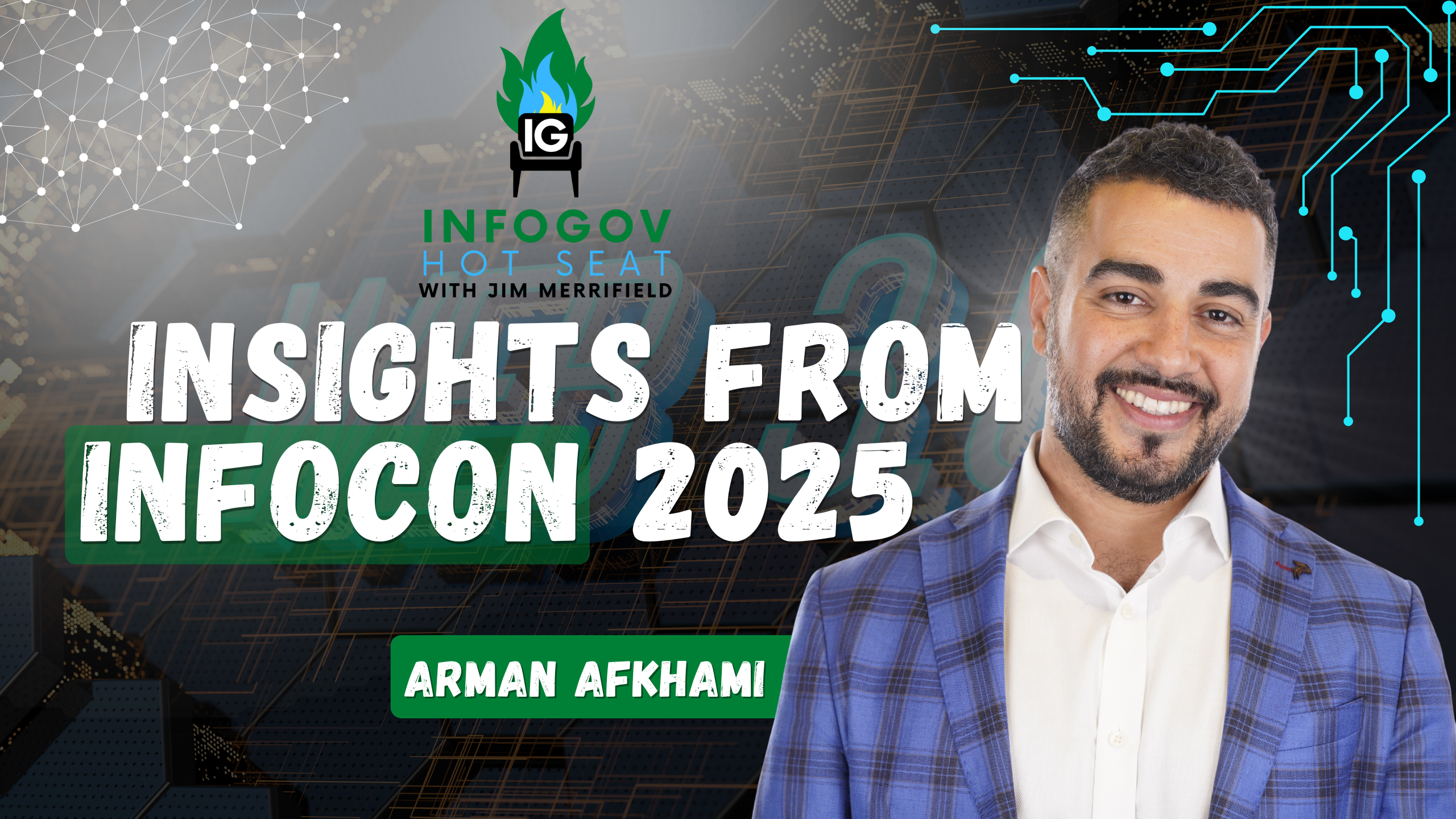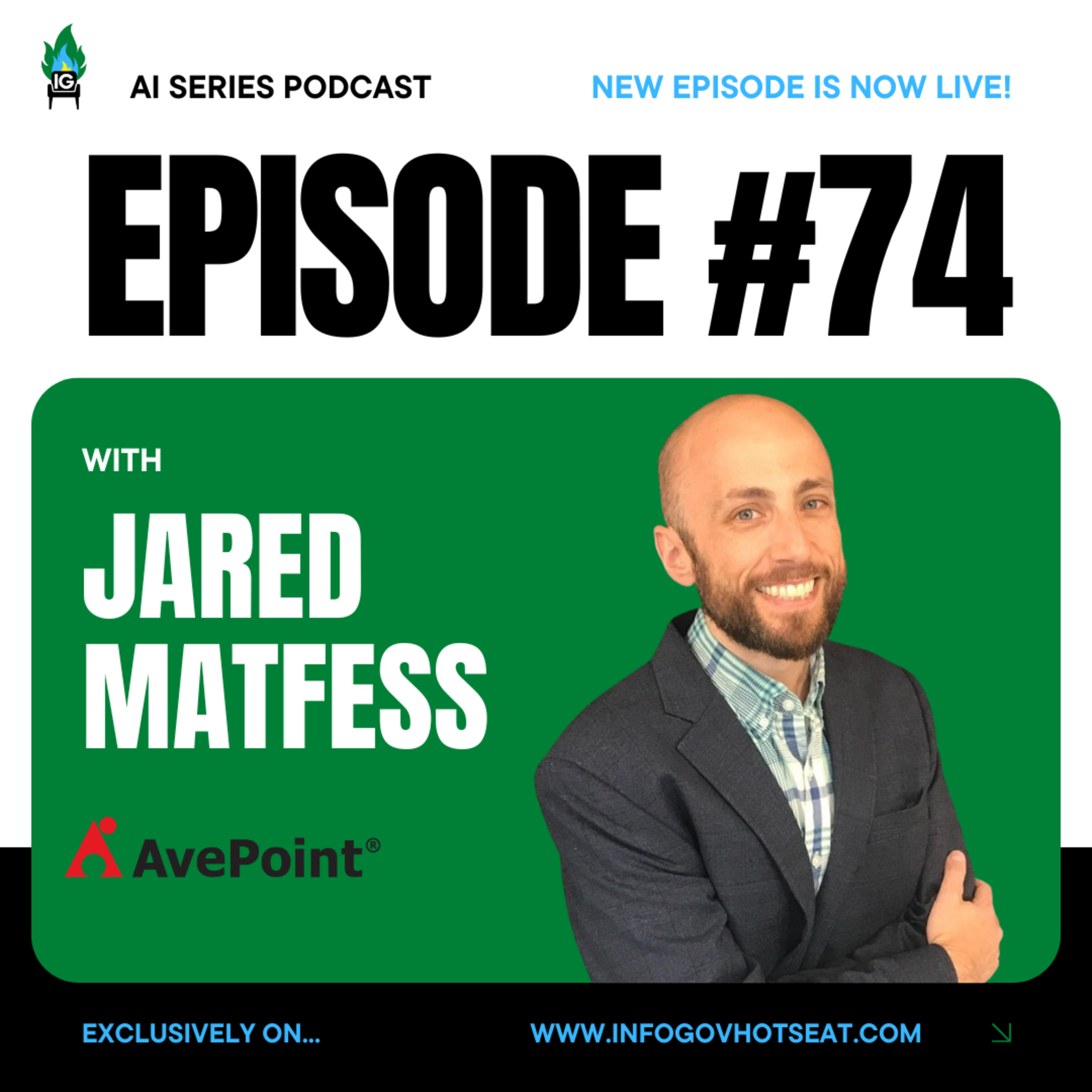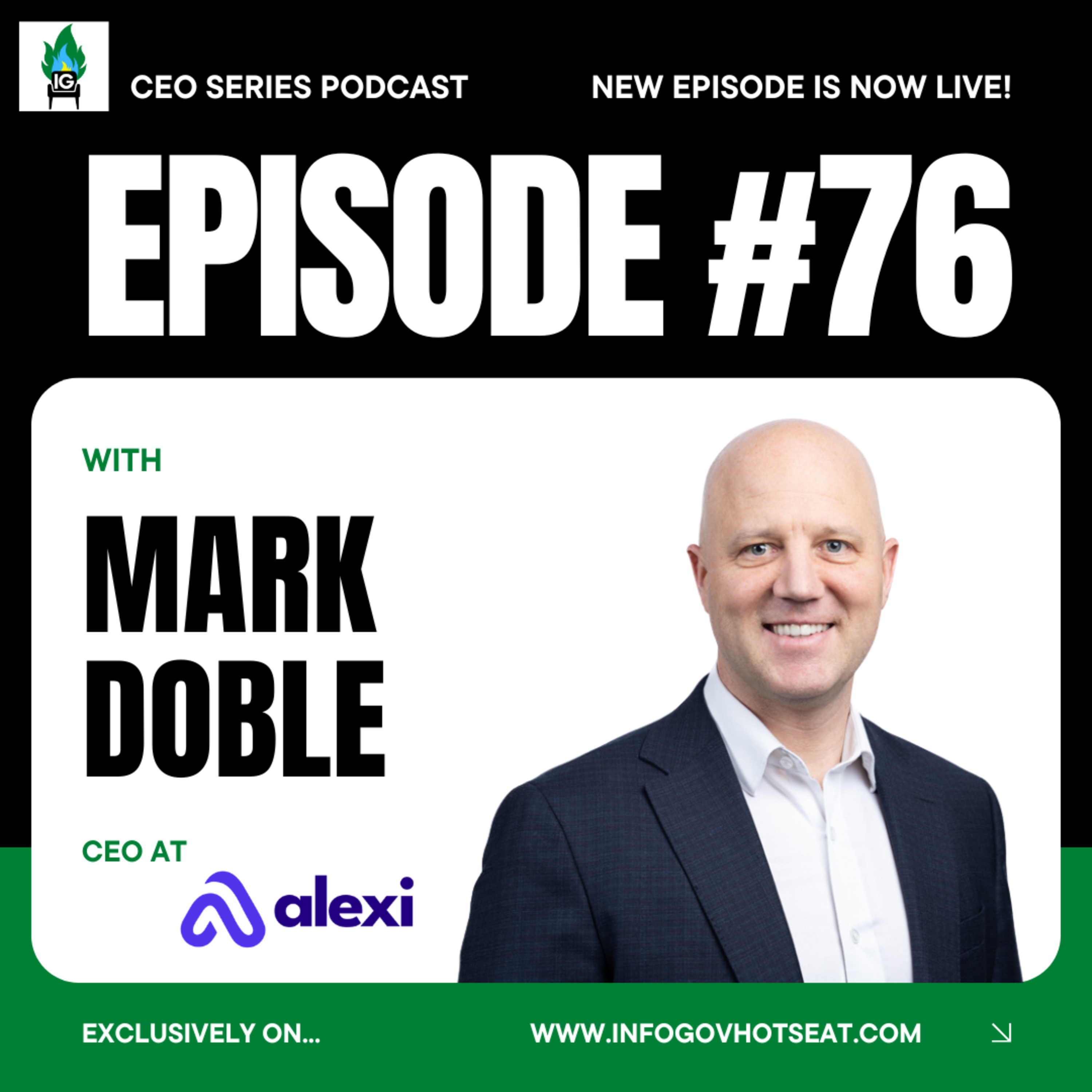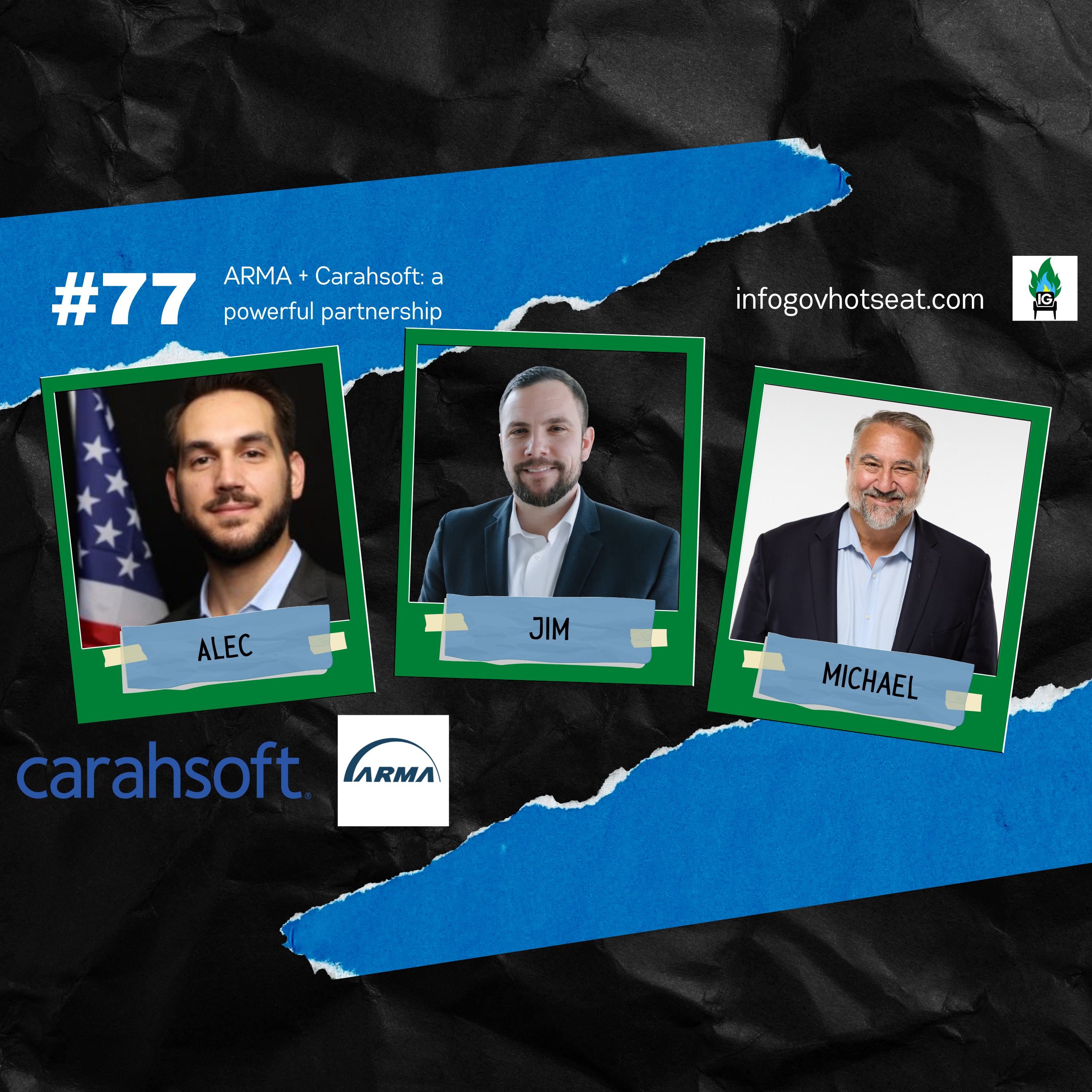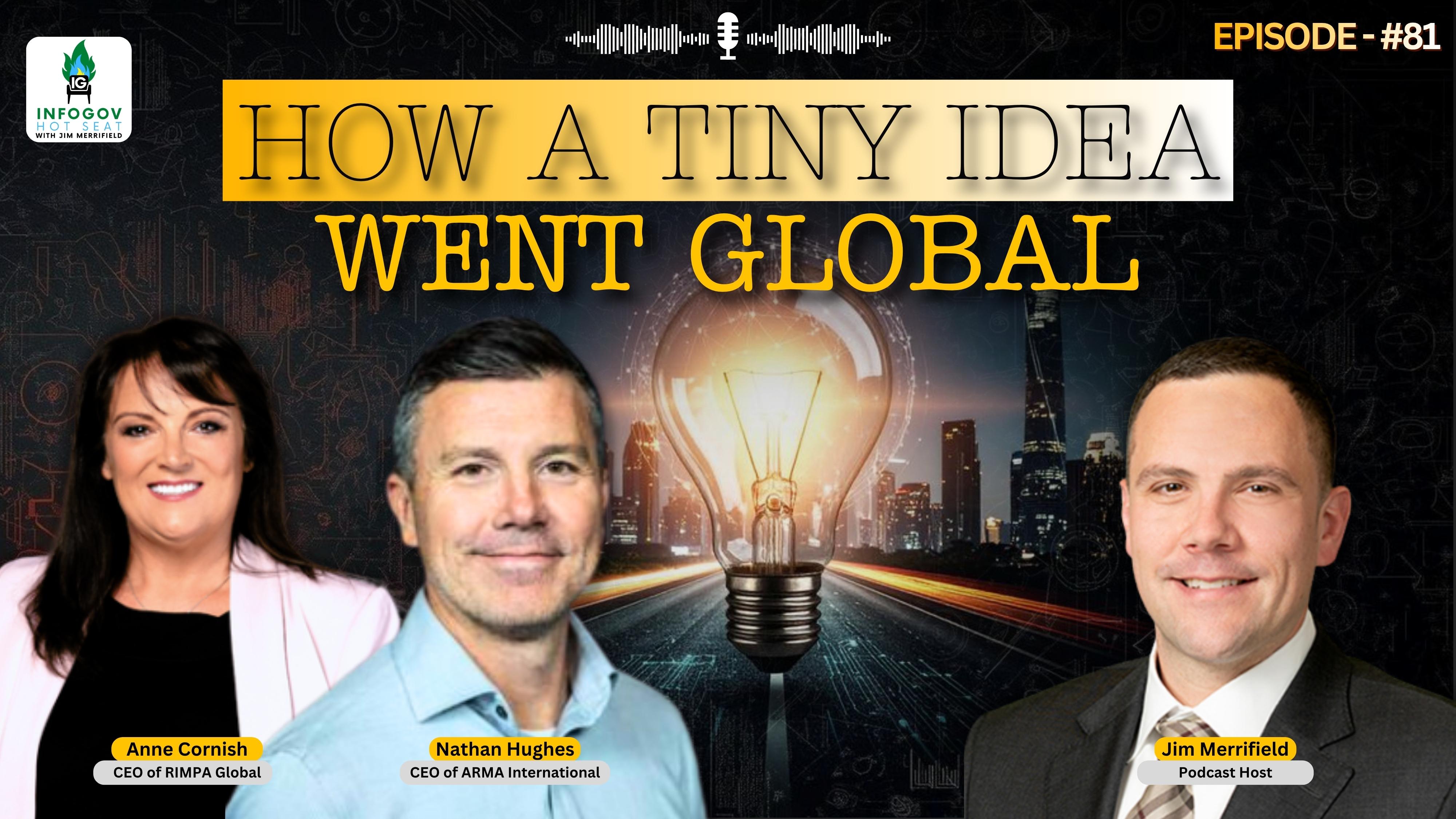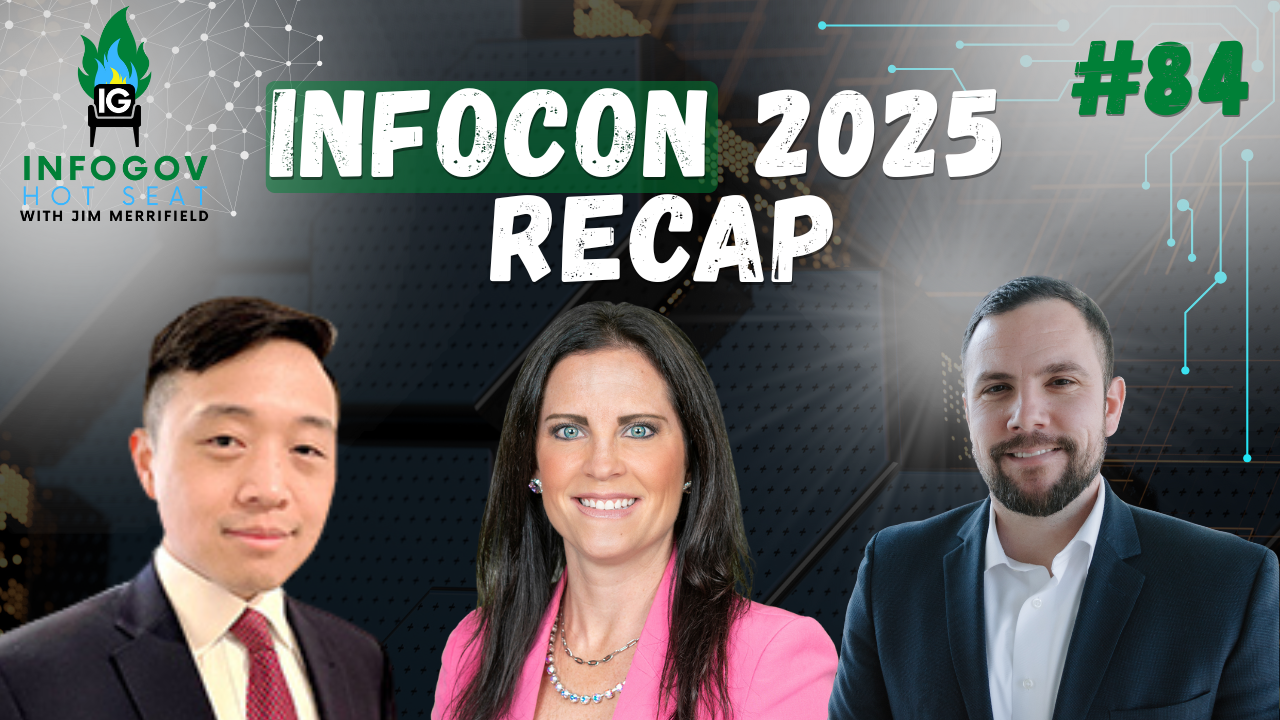IGHS48 - Downloading the Universe at InfoCon2024 with Phil Plait
In this conversation, Jim Merrifield hosts Phil Plait and Mike Salvarezza to discuss the upcoming Infocon 2024 conference in Houston. They delve into the evolution of data management in astronomy, the challenges of long-distance communication with space probes, and the significance of the conference for information professionals. Phil shares insights about his keynote presentation titled 'Downloading the Universe,' which will explore how astronomers handle vast amounts of data. The discussion also touches on personal reflections about space exploration and the importance of effective data management in the field of astronomy.
Jim Merrifield (00:01.133)
Well, hello and welcome to the Info Gov Hot Seat. I'm your host Jim Merrifield and with me today is Mike Salvarezza and Phil Plait. Welcome boys.
Phil Plait (00:09.806)
Howdy.
Jim Merrifield (00:11.181)
Good, it's great. Yeah, it's great to have both of you as guests on the hot seat. We're going to talk about InfoCon 2024 in Houston coming up in just a few weeks. But before we get into that topic, let's do some introductions. We'll start with Phil. Can you tell us a brief introduction of yourself, your current role, and one fun fact about yourself?
Mike Salvarezza (00:11.395)
Thank
Phil Plait (00:32.974)
Brief, right. I am an astronomer, professional astronomer, as well as I consider myself an amateur. I take my telescope out when something cool is happening up in the sky. I'm also a science communicator. I write a weekly column for Scientific American and a newsletter that comes out three times a week where I write about space and astronomy. And I love talking about every aspect of astronomy, and in this case, talking about how we get that information back from space so that scientists can study it.
Jim Merrifield (01:03.215)
That's an interesting topic there and a great background. Mike?
Mike Salvarezza (01:08.356)
Yeah, so I'm an information governance professional and consultant been doing this for several decades, which is something I'm afraid to admit. And very much enjoying working with Arma and helping curate content and create compelling sessions and all of that. But this keynote with Infocon coming up with Phil Plait is one of the most exciting ones that I've ever been involved with. And I'm really, really looking forward to.
Houston and to to talking with Phil down there or wherever wherever you are in Houston
Jim Merrifield (01:47.169)
in the space city. Yeah, for sure. I'm looking forward to the keynote and of course being at the conference as well. So let's talk about Infocon and the keynote. Phil, with your keynote at Infocon on the horizon, can you give us a sneak peek of what you're most excited about?
Phil Plait (01:47.502)
Me too.
Phil Plait (02:06.648)
Sure, the talk is called downloading the universe and it's about how we deal with the information that we get in astronomy. And there's a lot of it. Back in the day, before we had digital tech, it was all, you know, looking through the eyepiece or we would, we used to spray basically emulsion onto glass plates. So for those of us old enough to have used film.
Before they were on the little flimsy plastic, flexible plastic, we used to use glass plates and take data that way. And it was incredibly slow and difficult. I've actually done that. probably one of the last in my generation who's actually taken glass plates. But now it's all digital. And that comes with its own problems. It's better in a lot of ways, but it's a lot of information. And it turns out astronomy is pushing
this information technology pretty hard, faster than lot of other groups because our detectors are huge and we take an image, be hundreds of megabytes or gigabytes and our telescopes in space can be generating petabytes of information a day or a week. And that information has to get A, transmitted and then two, stored someplace. And so we're pushing this stuff pretty hard. And then that's where I'm gonna be talking about how this is all developed.
what we're doing now and what's on the horizon now for the future.
Jim Merrifield (03:35.039)
you definitely piqued my interest. Mike, what are you looking forward to with Phil's keynote?
Mike Salvarezza (03:39.62)
So I am not an astronomer and I don't play one on TV, although Phil does. Phil forgot to mention in his intro that he's part of several programs that are on some of the cable channels and Discovery and so on, Science Channel. And he is always such a compelling, engaging advocate for...
information about space. One of the things that always fascinated me, Phil, was the distance that we are talking about when we're talking about transmitting data. and I always, I always go back to the Voyager spacecrafts that were launched, what, 50 years ago or almost 50 years ago, that are out in interstellar space. They're actually out of the solar system and yet we're still receiving data from those probes.
So I'm fascinated to hear about how we here on earth are still communicating with technology that is that old and sending data over those distances and making sure that that data is still useful and intact and all of that. That's something that always fascinated me.
Phil Plait (04:58.2)
Yeah, that's a really good point. Yeah, you brought up a good point that a lot of our telescopes like Hubble, for example, that's orbiting the earth. That's just a few hundred miles up. Talking to it is nearly instantaneous. Even JWST, this giant infrared telescope that we just launched a couple of years ago.
That's only about a million miles away. So it takes a little bit longer for light to get there and back, but that's still, you know, seconds. You're talking to Voyager, Voyager 1 and Voyager 2, these two probes that were launched in the late 1970s. They are now billions of miles away. They're so far away, I'm not even sure what the exact number is. It's like 12 or 14 billion miles, something like that. The light travel time, just sending a signal to them.
takes like a day, it just takes hours and hours and hours to get that radio signal from engineers on the ground just to get to the probe. And then if the probe has to sit there and think about what they said and then send transmit telemetry back, it takes that much longer, that same amount of time to get back to us. that's difficult if something were to happen right away, it's gonna take you a couple of days before you find out if what you've sent worked.
And the technology is really, really old. The processors you use, this is an old example, the processor you have in your camera is better than what they had on Apollo. It's like, well, that's true. It's true for Hubble too. mean, those processors are pretty old. But with Voyager, yeah, it's 1970s tech. But there are still people around who know how to communicate with it. And in fact,
Phil Plait (06:56.834)
there was a problem with some of the hardware on Voyager recently, and they were able to fix it by basically rerouting around a part that had gone bad. And they had, you know, they have a map of the circuitry, and they were able to say, hey, you know, if we go this way, we can bypass this bad part, do what we need to do. They uploaded all the information, which took forever, and then tried it out, and it worked, it worked. This is...
Jet JPL, man jet jet propulsion laboratory, these folks built to last. And so these these probes are still out there taking data and doing stuff that they were not originally designed to do.
Mike Salvarezza (07:37.578)
And that is what fascinates me about those probes and that aspect of it. at ARMA, we're constantly looking for ways to talk about the management of data and the governance of data and information. And we often try to connect it with various industries. What's going on in the financial world? What's going on in the health industry? The space industry is something that I think the audience is going to really
enjoy hearing about. So Jim, to your point, what am I excited about? I'm just excited to hear space stories actually and connect it to what we do here on the ground with regards to information governance.
Jim Merrifield (08:23.521)
Yeah, it's going to be a very innovative conversation. can't wait to see how AI plays a part in this. I couldn't help but thinking, know, Phil and Mike, as you were talking about your different points and, know, Phil, you're going to talk about at the conference, you know, how...
prompt engineering will play a part in getting some of that analysis from different flights and the space industry. again, certainly with my appetite, I can't wait to hear the presentation live. So speaking of the conference, I'm gonna ask you Mike first, why don't you convince me, I'm gonna ask you to convince me in 30 seconds why I should register for Infocon 2024 to hear Phil Session.
Mike Salvarezza (09:12.58)
So does it take me 30 seconds to say Phil Plait? That's it. Seriously, I think that what I would say is that Infocon is the premier event for information technology professionals or information professionals, information management professionals. The technology part, the management part, the governance part, all of that.
comes together at this conference. It is the premier event for anyone working in this field. The fact that we have Phil Plait as our keynote to help connect what we do to the wonders of the universe, I think is just an awesome opportunity. The title of the presentation, Downloading the Universe, should be enough to just inspire people to come.
Jim Merrifield (10:11.309)
I agree. Phil, I'll ask you the same question. Convince me in 30 seconds why I should register.
Phil Plait (10:17.4)
first, golly, I'm excited to see me talk about your ear and that. I'm going to be talking about a lot of stuff that I don't think a lot of information professionals will necessarily have thought of. Like you said, Mike, you're dealing with stuff on Earth, you're dealing with health and security and those topics you mentioned, but information technology is everything, it's everywhere, right? And this is something that astronomers have had to deal with forever.
from Galileo to heck, from the Babylonians up to now. And it's getting a lot more complicated now. And so I'm going to be talking about a few aspects of this that I bet people don't know about. Like for example, the spy technology that we had in the 60s and 70s and how we retrieve that information. And that turns out to be important for space -based astronomy because a lot of these things were taken from
sub orbit or orbit and they had to get that information back to the ground into the hands of the information folks here. And then developing it up through Hubble and JWST talking to Voyager, New Horizons, another probe, the one that went past Pluto and how that was brilliantly done but incredibly slow and yet still at the forefront of what we could do at the time and probably still could be doing now. And
Everybody loves space. People like astronomy. turns out it's cool. It's fun. And I had some personal stories about some things I've had to do in the past as well in this area. So I think it's going to be a lot of fun for me. And I'm hoping it's going to be fun for the audience. And I figure as long as I'm having fun, they probably will be too.
Jim Merrifield (11:59.479)
Yeah, you're going to set the tone for the event. Mike, were you going to say something?
Mike Salvarezza (12:02.484)
I was going to just, just occurred to me, you know, fill your, your enthusiasm for space, is evident. I guess it was last week. There was the Polaris mission where, where some private citizens were doing a space walk on, on a, on a capsule. think it was launched by SpaceX. is that something that you would do if you had the opportunity? you do that?
Phil Plait (12:22.146)
you
Phil Plait (12:27.662)
Nope. Nope. I love space exploration. I watched Apollo 15 launch in Florida with my family when I was a wee little tot. But I get sick on a playground swing. So I'm not going to be doing that for a TV show some years ago. I actually flew with the Thunderbirds on an F -16. And it was cool.
Mike Salvarezza (12:37.368)
Okay.
Mike Salvarezza (12:43.89)
Ha
Phil Plait (12:51.584)
and then I wanted to die. It was like the rest of the day I just felt like I'm going to vomit everything I've ever eaten in my entire life. So no, I do not want to go on a rocket. That would be extremely unpleasant. Let say it way. I'd like to be in space like on the Enterprise where there's artificial gravity and they're not flinging me around and all that kind of stuff and I want to float. That would be awesome. Don't want to go to space. Very different thing.
Mike Salvarezza (12:54.308)
Yes.
Mike Salvarezza (13:17.432)
Got it. Very interesting. Very interesting.
Jim Merrifield (13:19.565)
Yeah, fair enough. So I know Mike, Phil, we've talked about a lot, especially the keynote and what's going to go on at Infocon 2024 in Houston in just a few weeks. Before we let you go, Phil, Mike, is there anything else you'd like to share with the audience? Maybe, Mike, we'll start with you.
Mike Salvarezza (13:41.112)
I think you got to be there. think, I think Houston's the place to be. I'm looking forward to it. I think, you know, it's not just about cool space stories in my opinion. I think space and the exploration of space has, has reached a new level of late. And, and I find it very, very exciting. The reason I asked you that question, Phil, about would you, would you go into space? yeah, I think the rigors of getting there.
It's probably as hard as getting on a flight from LaGuardia to Houston these days. I love going to Houston. I don't like getting to Houston. But I think space is having a renaissance, real renaissance. And I think it's an exciting time for that industry. And so I'm really excited to hear the information management side of
So that's what I'm looking forward to.
Jim Merrifield (14:35.989)
Thank you.
Phil Plait (14:36.494)
It's been fun working on this talk because I don't usually talk about this. I talk more about the science or what's cutting edge or what has this telescope done or what are we doing on Mars? And the idea of, well, yeah, we're doing all this great stuff, but an important part of science is communicating it, is actually having this data and analyzing it and publishing it and figuring out what's going on. And so this is all part and parcel of what we do all the time, but it's...
kind of unheralded. So I'm excited to be able to talk about this to a crowd of professionals who know about this stuff, but maybe not this aspect of it. It's pretty cool.
Jim Merrifield (15:17.486)
Yeah, we're excited for sure. So I mean, thank you both for joining me today on this episode, the space edition, space edition of the InfoCon InfoGov Hot Seat . I don't know what to call this edition, but it's definitely a space edition, right?
Mike Salvarezza (15:34.35)
It's the final frontier for InfoGov Hot Seat.
Jim Merrifield (15:37.367)
That's right, right? So again, thanks so much, both of you, Mike and Phil, for joining us today and sharing some insights into the presentation, the keynote, Phil, that you'll deliver at Infocon, and also Mike, the conference in general. And again, I'm excited as well. It's the premier conference for us in this industry. Looking forward to seeing both of you in person in Houston.
Of course to our audience, if you'd like to be a guest on the InfoGov Hot Seat, all you have to do is submit your information through our website, infogovhotseat .com, and we'll get you on the calendar. And thank you so much and enjoy the rest of your day.
Mike Salvarezza (16:20.196)
Thank you, Jim.
Phil Plait (16:20.322)
Thank you.

President, Pontus Consulting
As a Knowledge Leader and independent consultant, Mike provides key insight and expertise in the areas of culture and behavior, as well as serving as an industry expert on Information Governance, Records and Information Management and eDiscovery. Mike’s tenured career includes extensive experience in the complementary disciplines of information technology, records and information management, compliance systems and culture and behavior, enabling Mike to succeed in traditionally difficult areas by combining unique perspective and knowledge.
Mike now heads up Pontus Consulting, LLC, and focuses on Ethics and Compliance consulting, with a specialized focus on Information Governance. He is a frequent and distinguished speaker, writer and thought leader on these important topics.
In addition, Mike formerly was part owner of the MER Conference, an industry leading conference focused on Information Governance, and was solely responsible for curating the content delivered at this event and throughout the year. He continues in this capacity for ARMA InfoNext

Science Communicator / Speaker
Dr. Phil Plait is an astronomer, author, and science evangelizer. His acclaimed Bad Astronomy Blog, where he wrote about space, astronomy, and science, has been hosted on Discover Magazine, Slate, and SYFY.com. He now writes the Bad Astronomy Newsletter which goes out to over 21,000 people around the world. He has written four books — "Bad Astronomy", "Death from the Skies!", "27 Nerd Disses: A Significant Quantity of Disrespect" (with web comic artist Zach Weinersmith), and “Under Alien Skies — and is a sought-after consultant for science fiction books, TV shows, and movies. He was the head science writer for the first season of "Bill Nye Saves the World" on Netflix and was the science advisor for the CBS series "Salvation". He was also the science advisor for the 2016 Hollywood hit movie, “Arrival”.
He wrote and hosted “Crash Course Astronomy”, a 46-episode web series hosted on YouTube that provides a quick and fun introduction to astronomy for interested learners. It currently has over 80 million views.
He currently lives in rural Virginia with his wife and dogs.









